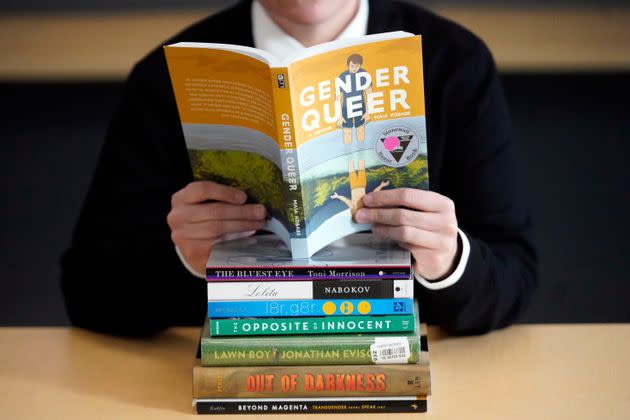Virginia Judge Tosses Legal Attempt To Limit Book Sales, Distribution To Kids
- Oops!Something went wrong.Please try again later.

A staff member at the Utah Pride Center in Salt Lake City poses with "Gender Queer" and other books that have seen complaints from parents. (Photo: Rick Bowmer via AP)
A Virginia judge has dismissed legal attempts to prohibit the distribution and sale of two books to minors after they were accused of being obscene and unfit for children.
“Gender Queer,” an illustrated memoir about identifying as nonbinary, and “A Court of Mist and Fury,” a young adult fantasy novel, were the subject of petitioning by two Republican politicians earlier this year in Virginia Beach under an archaic state obscenity law.
The law allows members of the public to file a petition to prohibit a book’s sale or distribution if it’s found to be obscene. Anyone who then sells, distributes, publishes or exhibits it is “presumed to have knowledge that the book is obscene,” according to the law, and could face criminal charges.
Virginia Beach Circuit Court Judge Pamela Baskervill on Tuesday ruled that the state law is unconstitutional, as it violates both due process and free speech rights. She also ruled that the petitions — one for each book — failed to show that the texts are obscene. Both “Gender Queer” and “A Court of Mist and Fury” include sexual content.
The petitions were filed by state Del. Tim Anderson, a Republican representing the 83rd District, on behalf of former GOP congressional candidate Tommy Altman. That came in the wake of complaints surrounding public school libraries in Virginia Beach, where copies of both books had been found, according to local newspaper The Virginian-Pilot.
Anderson said that Altman is considering an appeal.
“Fundamentally, my client believes there should be a different standard of obscenity for children than currently exists for adults, but that will require review by higher courts to conclusively answer this question and possibly additions to the code,” Anderson said in a statement Tuesday.
The legal action had been challenged by bookseller Barnes & Noble and the American Civil Liberties Union, which represented several organizations in a motion against the proceedings.
“The First Amendment protects literary expression, even when some people find portions of the works difficult or objectionable. All people should be able to choose what they wish to read,” Matt Callahan, a senior staff attorney for the ACLU of Virginia, said in a statement.
The Virginia Library Association, which was represented by the ACLU, also celebrated the judge’s decision in a statement to The Virginian-Pilot.
“What was confirmed from today’s ruling is that it is unfair to refer to partial contents of a book as ‘pornographic’ or ‘obscene,’” said Lisa Varga, the organization’s executive director. “We have seen those words used a lot in Virginia Beach, particularly when it comes to books in school libraries. The truth is that there is a legal standard a work has to meet before those words can be used to describe it.”
This article originally appeared on HuffPost and has been updated.
